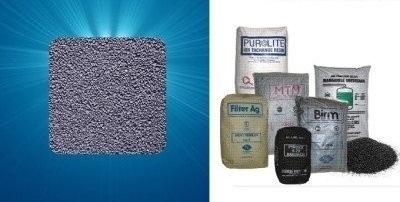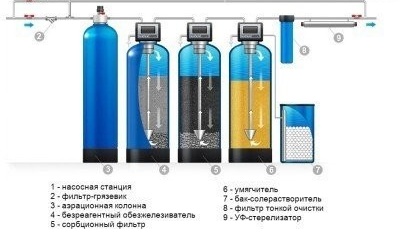How to get rid of ferrous iron in well water?
Good day! Water flows from the well, in which a red sediment appears over time. I handed over water for analysis, found ferrous iron - 2.8, the rest is normal. Are there any budgetary ways to get rid of iron or will I have to pay a substantial amount for sophisticated equipment? We live in a house with the six of us all the time, the well is 45 meters, there are seven draw-off points, we spend about 1-1.5 cubic meters per day. meters of water.
Iron removal filter
To get rid of divalent iron dissolved in water, you will need to oxidize it, then it will become trivalent. In this form, iron turns into the very unpleasant ginger precipitate that needs to be filtered. This problem can be solved in various ways, but none of them can be called simple.
Experts recommend ordering special equipment that uses the DIRM catalyst. This is the so-called reagent-free method of removing ferrous iron from water. Will have to choose a filter system. In this case, a de-ironing filter with a volume of 70 l can be useful, which allows you to get purified water in an amount of 2.4 cubic meters. m / h However, one should take into account the manganese content, as well as the permanganate oxidation of water. If these indicators are higher than normal, the process of iron oxidation can slow down significantly. In addition, you will need a charcoal filter, and to get clean drinking water, experts recommend having a reverse osmosis system.

Using oxidizing agents such as BIRM and its analogs, as well as special equipment, it is possible to efficiently remove ferrous iron in water
Such a filtration system is convenient in that it can be equipped with automation that will control the process depending on the flow of water or on timer settings. However, the cost of this option is quite high, so many owners of private houses invented folk ways to get rid of unnecessary iron impurities.
High iron does not pose a serious risk to human health. Sanitary standards, this indicator is ranked in the third category of importance, i.e., to the lowest. In some cases, due to the high content of iron in people, allergic reactions can be observed. But the technique for such additives is very sensitive, the number of breakdowns of all elements of the water supply system will increase several times.

This diagram illustrates one of the equipment configuration options that allows you to purify water from ferrous iron and other harmful impurities
Iron Oxidation Naturally
The simplest and cheapest way to defer the water is to let the ferrous iron oxidize naturally and then let the water settle. To do this, you must:
- Find a storage tank of sufficient size from food grade plastic, stainless steel, etc.
- Install it in a suitable place, such as on the roof.
- Organize the flow of water from the well through a shower diffuser (this improves aeration of the water).
- To ensure the collection of settled water not from the very bottom of the tank, but slightly higher so that the sediment does not fall into the water supply.
Optimally, if the size of the storage tank exceeds the daily water flow. This allows you to collect water in the evening and use it freely throughout the day.
Craftsmen also save in this way: they use the calculations of specialists, but refuse the services of installation companies. Barrels, an oxidizing agent, heads and other equipment are purchased, and installation is carried out on their own.



8 comments